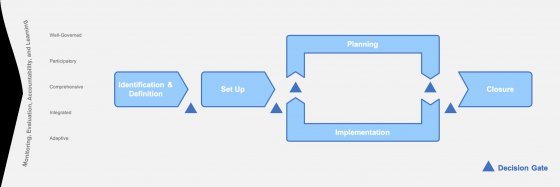Projects In Uncontrolled Environments

Peter Marlow discusses the unique challenges of managing projects in the humanitarian and development sectors and how a training and certification scheme called Project DPro that’s celebrating its 10th anniversary this year is making a big difference.
He explains why it’s needed, how it’s put into practice, and how you can help.
“Operations keep the lights on, strategy provides a light at the end of the tunnel, but project management is the train engine that moves the organization forward.” – Joy Gumz
Overseas Aid is big, really big, as the late Douglas Adams might have put it. For example, in 2019 the UK government spent £14bn of public money on foreign aid and is committed to an annual target of 0.7% of GDP being spent on aid. That’s almost one Crossrail per year. It is part of a bigger picture of public and private donations being spent on trying to improve the lives of people living in the developing world.
A significant amount of this investment ends up directly or indirectly in projects being managed by international, national or local non-governmental organisations (NGOs) and charities.
They have project managers and project teams that manage many of the same challenges that all project managers face: delivering on time, on scope and within budget.
The context, however, is very different. They may be managing food distribution in a refugee camp, helping farmers to access markets, helping populations trapped by conflict or improve the lives of people living in slums. The projects they are trying to manage are Projects in Uncontrolled Environments, not like PRINCE2.
Given these challenges, development organisations tend to focus on the development-humanitarian-specific areas of their projects and recruit specialists with an appropriate in-depth technical knowledge such as health or water and sanitation.
They are then required to manage projects and lead project teams – although they sometimes lack experience and skills in project management. As a consequence, the quality of project management can be variable with success dependent more on luck than judgment.
Wheels are constantly being reinvented. There is no culture of improvement to embed good practice. Managers are understandably reluctant to admit mistakes as this can lead to the loss of donor funding. So, learning opportunities are missed.
Inevitably many projects under-deliver despite best intentions. So, early in 2007 a number of Non-Governmental Organizations (NGOs), including Save the Children, Oxfam, Care, World Vision, Habitat for Humanity, CRS, Plan International and Mercy Corps asked LINGOs, a skills and capacity building NGO (now part of Humentum), to develop sector appropriate and comprehensive project management learning materials for NGOs.
The result was the Guide to Project Management for Development for Professionals (PMD Pro) launched in 2010 in multiple languages with free online learning tools and resources.
A new independent NGO called PM4NGOs was established to own the certification and APMG agreed to administer the exams online. In March 2020 an updated second edition was published and rebadged as Project DPro to align with the new Program DPro Guide.
Over the last 10 years we are really proud to have reached 30,000 development workers around the world. The fact remains that there are hundreds of thousands more. Many of them work for small, local organizations in their own communities.
Many of them are volunteers. An example might be a community women’s group working in a slum or a farmers’ cooperative. We want to reach out to as many people as possible to help them reap the benefits of improved project management.
We have made learning materials and the Project DPro Guide available for free. Tens of thousands of people have accessed these – but many also want the opportunity to the take the Project DPro certification.
You can help. We are crowdfunding to raise money for scholarships to enable staff from local organizations to take the certification.
Many of you have received the benefits of professional certification. It would be wonderful, if you could help us to reach out to your colleagues in the profession of project management around the developing world. You can do this at https://charity.gofundme.com/o/en/campaign/project-dpro.

The Project DPro Phase Model
Project DPro is best described as a light-weight project management methodology based on industry best-practice and contextualized for the humanitarian and development sectors. Some of the methodology will be familiar to readers but other parts are specific to development.
Project DPro uses a phase model approach, providing guidance on what ought to be covered in each phase of the project. The five phases are:
- Identification and Definition: It is during this phase that the project teams identify and define needs, explore opportunities, analyse the project environment, and design alternatives for project design. The decisions made during the Project Identification and Definition Phase set the strategic and operational framework within which the project will subsequently operate.
- Project Set Up: It is during this phase that the project is officially authorized and its overall parameters are defined and communicated to the main project stakeholders. It is also during this phase that the project team establishes the high-level project governance structure.
- Project Planning: Starting from the documents developed in earlier phases of the project, the team develops a comprehensive and detailed implementation plan and supplementary plans (e.g. Supply Chain) that provides a model for all the work of the project. These plans are revisited throughout the life of the project and updated (if necessary) to reflect the changing contexts of the project.
- Project Implementation: The day-to-day work of project implementation is to lead and manage the application of the project implementation plan: Leading the team, dealing with issues, managing the project team and creatively integrating the different elements of the project plan.
- Project Closure: This phase includes implementing all the transition activities that need to occur at the end of a project, including (but not limited to) confirming the deliverables with beneficiaries, collecting lessons learned, and completing the administrative, financial and contractual closure activities.
Threading through each of the phases are the five Principles of Project Management:
- Well-Governed: The governance structure of a project provides a framework for management and decision-making, clearly articulating the roles, responsibilities, and setting tolerances.
- Participatory: Participation of stakeholders throughout the entire life of the project is important for ensuring ownership and ultimately project success.
- Comprehensive: Equal rigor and attention must be applied to each phase of the project, and learning from each stage transferred to the next.
- Integrated: Phases, tools and processes in a project are not silos, they cannot efficiently function together unless they are integrated with one another.
- Adaptive: Change happens. The project manager, team, and stakeholders must be adaptive to analyze the changing project environment and respond as necessary.
A cross-cutting theme throughout the whole project lifecycle is Monitoring, Evaluation, Accountability and Learning (MEAL). Monitoring tracks the operational work of the project against the plan. Evaluation tends to focus on tracking progress on project outcomes. Accountability and Learning ensure that there are mechanisms in place to request and receive feedback from stakeholders during the project, learn from that feedback, and use it as a tool for iterative project planning.
Unlike some other project management methodologies, Project DPro describes and demonstrates project management tools suitable for development projects with examples and case studies.
For example, the Problem Tree and Objectives Tree to help identify needs and interventions, and the Logical Framework or ‘LogFrame’ for mapping the project intervention logic against activities, outputs, outcomes and goals.
Like other successful project management methodologies, Project DPro is not a robotic or template driven process. It can and should be adapted to suit organisations and particular situations.
The Guide to the Project DPro can be downloaded for free at https://www.pm4ngos.org/project-dpro/. If you want a quick overview you can download the Quick Guide to the Project DPro. Free interactive courses are available on-line at https://pyramid.arist.co/courses.
Looking back over the last 10 years, it has been incredibly rewarding to hear stories of the difference that improved project management practice has made to people’s lives: Project DPro has made their lives easier – providing simple and adaptable tools and techniques that help them do more with less and in many cases, do it better.
For example, in a Northern Nigeria Refugee Camp, the Project Manager reckoned that Project DPro had saved him $1M.
Fast tracking, crashing and schedule management meant they could move medical supplies out of warehouses before the use-by dates – medical donations are often fairly close to the limit as companies donate by emptying stock that is near the end of its shelf like.
In Kenya, a project was implemented using Project DPro to digitize, improve timeliness and reduce the cost of birth registrations. In North-West Syria a project to provide prostheses to 300 children and women amputees injured in the ongoing conflict was implemented using Project DPro.
I hope that this article has given you an appreciation of unique challenges of project management in the humanitarian and development sectors and why Project DPro was developed to address these challenges – not just another project management methodology – and how you can help at https://charity.gofundme.com/o/en/campaign/project-dpro.
Peter Marlow is a member of the Board of PM4NGOs and Director of Project Managers Against Poverty. He is also a trustee of the Kambia Appeal, a UK-based charity that works to improve maternal and child health in the Kambia district of Sierra Leone. Peter is a Member of the Association for Project Management (MAPM) and a Chartered Engineer (MIET). He can be reached at peter@pm4ngos.org.




